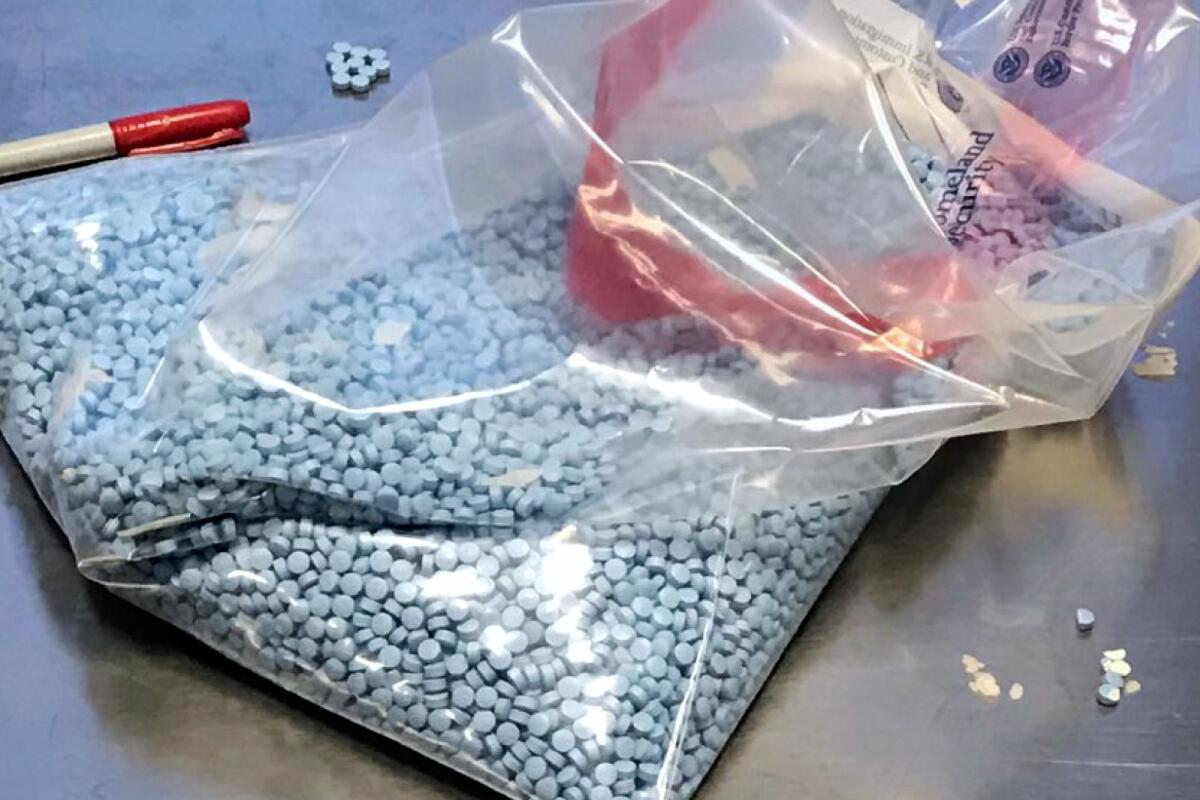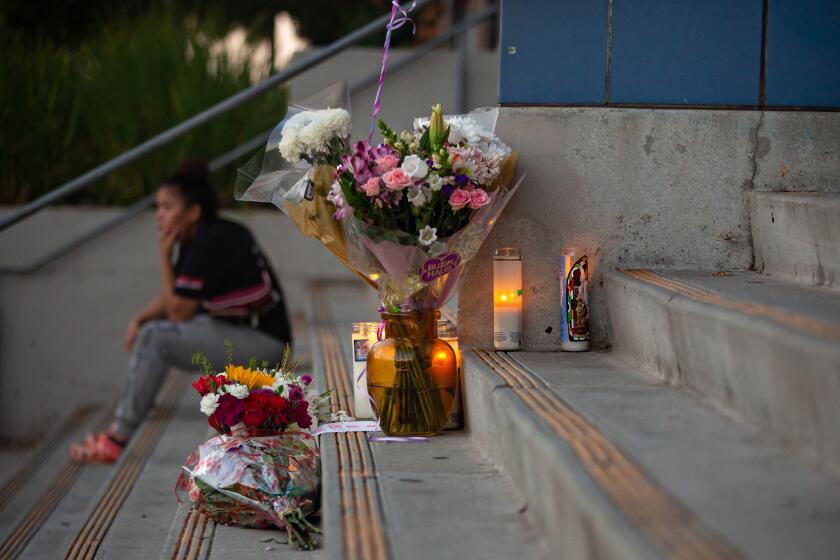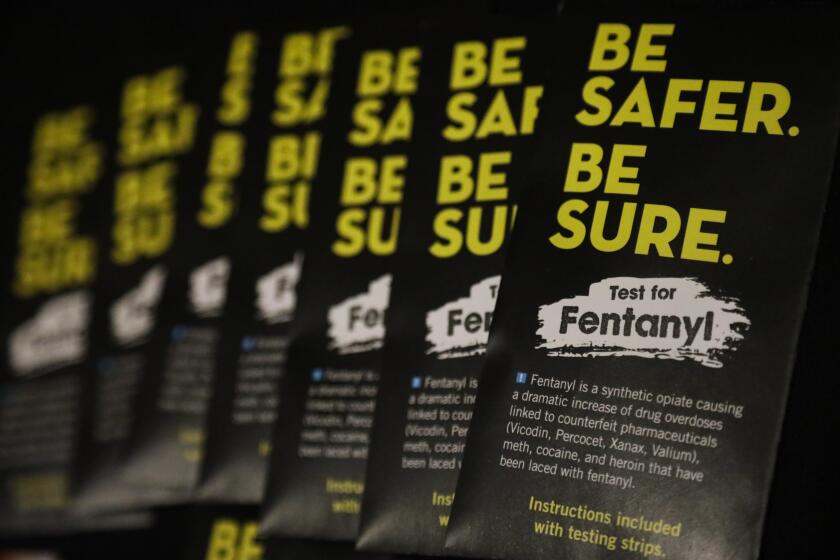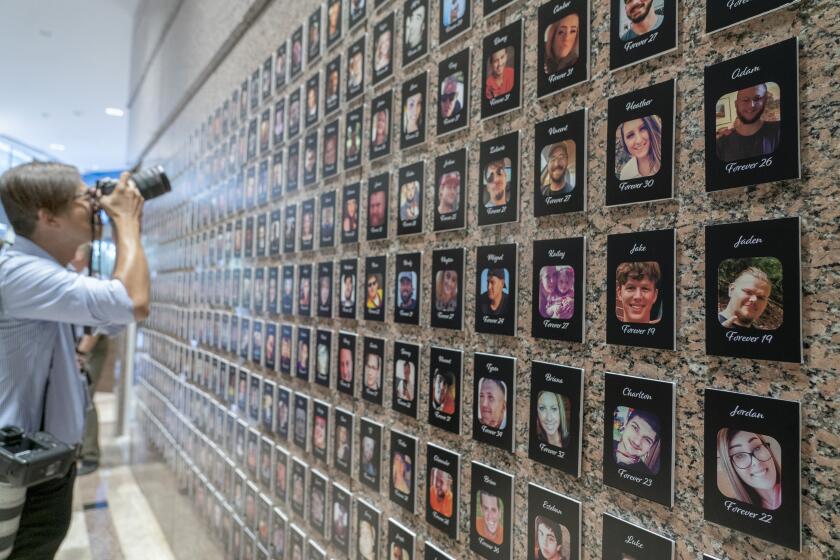Growing fentanyl crisis is leaving ‘trail of death’ in its wake, federal officials warn

- Share via
In the last two months, agents with Homeland Security Investigations have seized as much fentanyl as they did in all of 2019, federal officials said, warning that the amount of the drug hitting the streets is increasing every year with deadly consequences.
Last year, there were 71,000 fentanyl-related deaths in the United States, including 1,600 in Los Angeles County, U.S. Atty. Martin Estrada of the Central District of California said at a Monday news conference in L.A.
“Fentanyl has painted a trail of death across the country, across our district and across our community,” Estrada said. “The crisis today is unprecedented.”
The dangers are especially heightened in L.A. County, which has turned into a major distribution hub for fentanyl as Mexican drug cartels have flooded the streets with cheaply manufactured counterfeit pills, often disguised to look like prescription painkillers such as oxycodone.
On Monday, officials with the Department of Justice, the FBI, the Drug Enforcement Administration and the U.S. Postal Inspection Service raised alarms about the continued growth of fentanyl.
Fentanyl deaths among teens more than doubled from 2019 to 2020, increasing from 253 to 680. Last year, the number jumped to 884, according to a report from the Journal of the American Medical Assn.
In many cases, officials said, the victims of fentanyl overdoses are unaware that the drugs they are taking contain fentanyl, which is considered significantly stronger than heroin and morphine and can be lethal at far smaller doses.
“The widespread death and suffering is being driven by drug cartels who care far more about profits than people’s lives,” Estrada said. “These drug-trafficking organizations continue finding ways of getting large shipments of fentanyl into the country.”
According to the U.S. Centers for Disease Control and Prevention, drug use among teens ages 14 to 18 remained steady from 2010 to 2020, but a report from the Journal of the American Medical Assn. found teen fentanyl deaths more than doubled from 2019 to 680 deaths in 2020.
Last year, that number increased to 884 deaths. Fentanyl was the cause of more than 77% of drug deaths among teens last year.
During the pandemic, drug dealers and distributors moved to social media and the dark web to sell illicit drugs, said Bill Bodner, special agent in charge of the Drug Enforcement Administration in Los Angeles. The result has been that younger victims have been ensnared in drug use and suffered overdoses by using drugs that they didn’t know contained fentanyl.
“Nightclubs, bars, social gatherings — these places were shut down [during the pandemic], so what did drug distributors do?” Bodner said. “They went to social media.”
Fentanyl is often mixed with other drugs (including heroin, methamphetamine and cocaine) to increase potency, but it can be deadly. Test kits can help.
Federal officials believe most of the fentanyl in the U.S. is being smuggled in, mostly by the Sinaloa and Jalisco New Generation cartels, which manufacture fentanyl pills for about 13 cents each in Mexico, Bodner said.
In July, officials seized one shipment of 1 million counterfeit pills made with fentanyl, Estrada said.
But law enforcement officials said they’ve also found more incidents of the drugs being manufactured inside the U.S.
On Friday, for example, a federal grand jury indicted 36-year-old Christopher Hampton, accusing the Cerritos man of operating drug labs in Inglewood and Compton that used high-speed presses to make fentanyl and methamphetamine pills.
The drugs were sold on the darknet, an online world often accessible only through private, anonymizing browsers and used for illegal transactions. There, federal officials allege, Hampton operated as “Narco710,” selling nearly $2 million of narcotics.
Hampton was arrested Nov. 2, and federal agents seized 450 pounds of suspected narcotics and six pill-pressing machines believed to be able to make thousands of pills per hour. Several firearms were also seized.
Hampton, Estrada said, had also enlisted employees to sell and distribute the drugs across the area.
“This case illustrates how some traffickers have created all-encompassing networks to sell counterfeit pills,” Estrada said.
Fentanyl and other potent synthetic opioids ingrained in the nation’s illicit drug supply are killing more people in the U.S. than any other drug has.
The investigation was carried out by the FBI’s Joint Criminal Opioid Darknet Enforcement Team, or J-CODE, and the DEA’s HIDTA Tactical Diversion Squad. Hampton is expected to appear in court Wednesday for an arraignment.
On Monday, federal officials emphasized that they have used multiple tactics to curb the spread of fentanyl, including the 4-year-old Overdose Justice Task Force, which launches investigations into fentanyl poisonings and targets dealers for possible prosecution.
Since the task force was created, the U.S. Department of Justice has charged 51 defendants linked to overdoses.
But federal officials also said a public campaign educating children will be essential to curb the threat of fentanyl-related overdoses.
“Every parent and guardian must educate themselves and their children of all ages about poisonous fentanyl-laced drugs being sold on social media applications and via the darknet,” said Don Always, assistant director in charge of the FBI in Los Angeles.
More to Read
Sign up for Essential California
The most important California stories and recommendations in your inbox every morning.
You may occasionally receive promotional content from the Los Angeles Times.

















